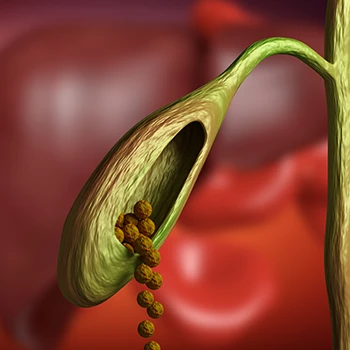After weeks of studying weight loss surgery and interviewing bariatric surgeons I’m acquainted with, I have gathered enough data on why weight loss surgery could be bad.
If you're looking to undergo this surgery to lose weight, you must be clear on all of the facts.
Here are all the answers to why weight-loss surgery might be bad.
Quick Summary
- Bariatric surgery can lead to complications such as food intolerance and potential weight gain.
- Some short-term effects of weight loss surgery include leaking from surgical wounds, wound bleeding, and bowel obstructions.
- According to Bariatric Innovations of Atlanta and General Surgery, up to 35% of patients undergoing bariatric surgery may develop gallstones, a significant long-term complication.
- From my professional experience working with clients who have had this surgery, there are many potential risks and lifestyle changes that are needed.
Types of Weight Loss surgery

Here are the main four types of weight-loss surgeries:
- Gastric bypass, often called Roux-en-Y, involves creating a tiny pouch in the stomach and linking it directly to the intestines. According to an article on Penn Medicine, this allows food to bypass the normal stomach and move straight to the intestines [1].
- Sleeve gastrectomy is done by inserting surgical instruments through incisions in the abdomen and cutting almost 80% of the stomach, limiting the amount of food you eat so you can lose weight.
- Biliopancreatic diversion with a duodenum switch is done after a sleeve gastrectomy. The majority of the intestines are connected to the duodenum, limiting how much nutrition (fats and proteins) is absorbed.
- Adjustable Gastric Band is made by inserting adjustable bands around the upper part of the stomach, which creates a small stomach sac. This small sac makes one feel fuller faster after eating less food.
Related article: Dr. Nowzaradan Diet Plan
Short Term Effects Of Weight Loss Surgery

Leak From Surgical Wound
This happens when a hole forms in the stitches and stomach fluids leak. Although it rarely occurs, it might lead to sepsis and septic shock when it does.
Stomach leaks might also lead to intra-abdominal and blood infections, leading to multi-organ failure and possibly death. As a result, the leak demands immediate attention.
Symptoms that you might be leaking include:
- Left chest and shoulder pain
- Shortness of breath
- Abdominal distention
Unfortunately, most of these symptoms don't show, and it's further complicated to diagnose a leak because there's no reliable, proven test for it.
Bowel Obstruction
One of the most feared consequences following a gastric bypass is bowel obstruction. It can be as mild as a bit of irritation or as severe as a life-threatening problem. According to an article in the National Library of Medicine, this might be caused by adhesions or an internal hernia [2].
When a patient experiences bowel obstruction, nothing can flow through the digestive tract.
This issue should be treated before the intestine's blood circulation declines and loses vitality due to the stress and swelling that develop.
The most severe condition relating to obstruction is bowel necrosis (no blood flow to the intestines), which is only managed through an emergency surgery procedure.
Signs of obstruction include the following:
- Pain during defecation
- Bloating
- Vomiting
- Abdominal tension
Excessive Bleeding

According to a study on the PubMed website, bleeding in the first few days following gastric bypass surgery is a common complication in 1-4 percent of patients [3].
Typically, this is not from quick bleeding during surgery (though this might happen) but from the lengthy staple line suture on which the abdomen has been operated.
While on most occasions, the bleeding is self-limiting and resolves after deep vein thrombosis is stopped, excessive bleeding may necessitate a blood transfusion or further hospital treatment.
Additionally, severe bleeding can lead to postoperative illness or even death.
Signs include:
- Hemorrhage
- Abnormal pain in the lower abdomen
Painful Cramping And Stomach Pains
Abdominal cramping after you undergo bariatric surgery may occur due to the body's natural recovery since it got sutures and is still adjusting to significant changes.
This discomfort is quite manageable with prescribed pain medication, and it usually subsides within a few days following surgery.
However, severe stomach pains and cramping after surgery may appear weeks or months later. It may indicate a post-surgical problem that should be detected and managed as early as possible.
Some of the difficulties might be attributed to general surgical reasons, while others could be attributed to the unique risks of weight loss surgery.
Signs include:
- Prolonged cramping
- Sharp stomach pains

Long-term Effects Of Weight Loss Surgery

Some patients who have lost weight due to this surgery experience long-term complications, including:
Anemia
Anemia and iron deficiency occur primarily in women after undergoing weight loss surgery, which was the case with one of my female clients. In the normal human digestive system, iron-rich foods are absorbed in the upper part of the stomach, known as the duodenum.
After a gastric bypass, the iron nutrients bypass the stomach directly into the intestines. This leads to less or no iron absorption and, hence, anemia.
Here is a list of supplements that will help you with your protein intake after a gastric bypass.
Signs of anemia or iron deficiency include the following:
- Headache
- Tiredness
- Rapid heartbeat
- Shortness of breath
- Paleness
To avoid or treat anemia, patients with iron deficiency post-surgery may require injectable iron, which includes more than the standard 18-mg multivitamin amount [4].
Depression
People who undergo weight loss surgery are more likely to suffer depression than other overweight people of the same age and sex.
From my experience working with clients who have undergone this surgery, I can attest that the emotional aftermath can be as challenging as the physical one. There's often a feeling of depression when the results aren't as immediate or dramatic as the patient had hoped.
This is compounded by the fear of regaining weight. It's a mental battle as much as it is physical, and it's important for anyone considering this path to be prepared for these emotional ebbs and flows.
"For many people, bariatric surgery is a "last option," and if it does not produce the expected results, patients are likely to suffer depression." Kasey Goodpaster, Cleveland Clinic's Bariatric
Signs of depression:
- Fatigue
- Excessive sleeping
- Lack of interest in activities
- Irritability
- Stress
- Anxiety
Gallstones

Gallstones are another unwelcome long-term effect of weight loss surgery that can occur in up to 35% of bariatric procedure patients [5].
Gallstones occur when a person has extremely high cholesterol levels and fatty deposits in the body.
When this happens, bile (liquid responsible for dissolving fats) cannot keep up with the excess fat, which begins to form fat lumps or stones.
In the worst-case scenario, the gallbladder may be removed during the weight loss surgery if a patient has a history of gallstones.
Signs of gallstones include:
- Indigestion
- Cramping
- Back abdominal pain
Bulge Inside The Stomach (Hernia)
Hernias are abnormalities, blockages, or holes in the stomach or groin lining after one has undergone bariatric surgery. Severe obesity is a significant factor for wound hernias and bulges in the wound following surgery.
If you strain after surgery, you're likely to experience incisional hernias, which form a sac that protrudes outside the stitched area. The sac may contain stomach fluids, which can enlarge even when you cough.
And if it's not treated with immediate effect, the bulge continues to grow bigger.
Adding salt to the injury, the only way to treat hernias is by going for a second hernia surgery after your weight loss procedure.
Signs of hernia include:
- Pelvic pain
- Groin discomfort
Side Effects Of Weight Loss Surgery

Obesity surgery usually incites side effects, which make recovery a lot harder.
Intolerance To Some Foods
Food intolerance means your body fails to digest certain foods as it would typically do. It is a side effect that occurs mainly after the adjustment of the gastric band procedure.
According to my client's personal experience, developing food intolerances after the surgery was a real and unexpected challenge. She found that her body suddenly couldn't handle certain foods that I used to enjoy without any issues.
This was particularly evident after her gastric band adjustment, and it took a lot of trial and error to figure out what she could and couldn't eat.
Because the adjustable bands create a small stomach, large food bites might not move down smoothly if they are placed too tight. Sometimes the band is so tight that drinking liquids becomes uncomfortable.
Malnutrition

Due to shrinking the stomach size during weight loss surgeries, patients feel fuller even with a slight food intake.
Patients who do not get enough nourishment may be malnourished in the long term.
Others may resolve to eat non-nutritious junk food or drink excess calories in the form of soda or alcohol.
Protein deficits are frequently observed one to two years after the treatment, which may be avoided by following a high-protein diet as recommended by a dietitian.
Calcium and vitamin supplements are also advised to be administered to patients with nutrient deficiencies.
Excess Wobbly Skin
Another nightmare of weight loss surgery is excess loose skin after surgery. When a person gains weight, the skin stretches to accommodate the body mass, which can damage the skin's elastin fibers and collagen.
One of my clients says that he was unprepared for how his skin, stretched from years of weight gain, didn't snap back after the surgery.
This left him with sagging skin that was not only a cosmetic concern but also a source of discomfort and irritation.
Sitting comfortably may be hampered by sagging skin near the glutes.
Additionally, sweat can build behind the skin folds, causing redness and irritation. These may necessitate extra plastic surgery to remove the excess skin. If the pain is not enough, plastic surgery is way too expensive.
Regaining Weight

The sad truth about weight loss surgery is that you can still regain weight after the procedure.
Choosing the wrong surgery procedure compatible with your body could lead to weight gain 12 to 18 months post-operation [6].
Another reason for weight gain post-operation is when a patient gets a fistula (a connection between the stomach and intestines) and foods go into the bigger stomach, not the tiny sac created during surgery.
A second operation to correct a gastric bypass may be necessary for some severe weight-regain situations.
On the other hand, this second operation increases the risk of problems such as bleeding, infection, high blood pressure, and gastrointestinal leakage.
Check out our top recommendations for the best fat burners there are.
Post-Surgery Lifestyle Adjustments and Challenges
Bariatric surgery marks the beginning of a major lifestyle transformation. While the physical changes are often the most apparent, the lifestyle adjustments and challenges that follow are equally pivotal and extremely daunting.
These adjustments extend beyond the immediate postoperative period and can impact various facets of a patient's life:
- Dietary changes and nutritional challenges: Patients must adhere to a strict diet that starts with liquids and gradually progresses to solid foods. Patients often have to learn to prioritize nutrient-dense foods and manage new sensitivities or intolerances. This shift can be emotionally and psychologically challenging.
- Physical activity and exercise: For many patients, especially those who were not active before surgery, this can be a challenging habit to cultivate.
- Social and emotional adjustments: Navigating social gatherings, explaining dietary restrictions to friends and family, and dealing with potential misunderstandings or judgments can be stressful. Additionally, as patients lose weight and their appearance changes, they may receive attention or comments that feel uncomfortable or invasive, impacting their emotional well-being.
FAQs
Why Should You Not Get Weight Loss Surgery?
You should not get weight-loss surgery because it is not a permanent solution to losing weight, aside from the lifelong complications that could even lead to death.
Does Bariatric Surgery Shorten Your Life?
Bariatric surgery shortens your life by five years [8], less than the average lifespan of people who don't undergo surgery.
Why Is Gastric Sleeve Bad?
Gastric sleeve is bad because of the short-term and long-term complications that arise after the procedure. They include excessive bleeding, kidney diseases, blood clots, and stomach leaks.
Can You Live a Normal Life after Gastric Surgery?
Yes, you can live a normal life after gastric surgery, but you'll have to make significant changes in your life. These changes include lifestyle, diet, and exercise habits.
References:
- https://www.pennmedicine.org/for-patients-and-visitors/find-a-program-or-service/bariatric-surgery/procedures/roux-en-y-gastric-bypass-rgb
- https://www.ncbi.nlm.nih.gov/pmc/articles/PMC5666042/
- https://www.ncbi.nlm.nih.gov/pmc/articles/PMC4370037/
- https://pubmed.ncbi.nlm.nih.gov/21111381
- https://www.hopkinsmedicine.org/health/wellness-and-prevention/iron-deficiency-after-gastric-bypass-surgery
- https://www.bariatricinnovationsatl.com/bariatric-guide/obesity-and-health/gallstones-after-bariatric-surgery
About The Author
You May Also Like






